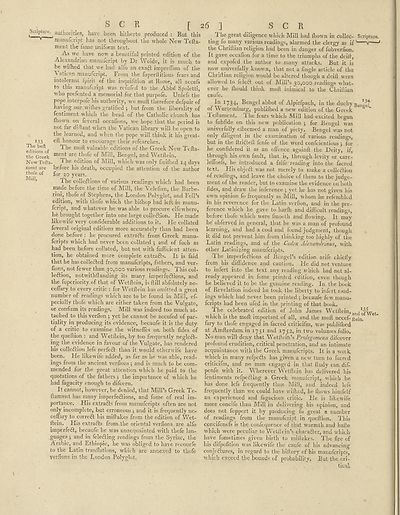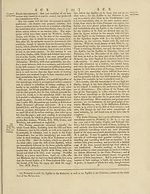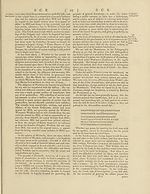Encyclopaedia Britannica, or, a Dictionary of arts, sciences, and miscellaneous literature : enlarged and improved. Illustrated with nearly six hundred engravings > Volume 19, Scripture-SUG
(32) Page 26
Download files
Complete book:
Individual page:
Thumbnail gallery: Grid view | List view

SCR [2
Saiphut.. authorities, have been hitherto produced : But this
manuicript has not throughout the whole New Tefta-
ment the lame uniform text.
As we have now a beautiful printed edition of the
Alexandrian manufcript by Dr Woide, it is much to
He wifhed that we had alfo an exadt impreffion of the
\ atican manufcript. From the fuperilitious fears and
intolerant ipirit of the inquifition at Rome, all accefs
to this manufcript was refufed to the Abbe Spoletti,
who pi-efented a memorial for that purpofe. Unlefs the
pope interpofe his authority, rve mull therefore defpair of
having our withes gratified 5 but from the liberality of
fentiment which the head of the Catholic church has
fhown on feveral occafions, rve hope that the period is
not tar ddlant when the Vatican library will be open to
the learned, and when the pope will think it his great-
eft honour to encourage their refearches.
1 he molt valuable editions of the Greek New' Tefta-
ment are thofe of Mill, Bengel, and Wetftein.
The edition of Mill, which was only finiftied 14 days
I33
The belt
editions of
the Greek
New Tefta-
ment are
thofe of
Mill,
before his death, occupied the attention of the author
for 30 years.
The collections of various readings which had been
made before the time of Mill, the Velefian, the Barbe-
rini, thofe of Stephens, the London Polyglot, and Fell’s
edition, with thofe which the bifhop had left in manu¬
fcript, and whatever he was able to procure elfewhere,
he brought together into one large colledtion. He made
likewife very coniiderable additions to it. Fie collated
feveral original editions more accurately than had been
done before : he procured extracts from Greek manu-
fcripts which had never been collated ; and of fuch as
had been before collated, but not with fuffieient atten¬
tion, he obtained more complete extra&s. It is faid
that he has colle&ed from manuferipts, fathers, and ver-
ftons, not fewer than 30,000 various readings. This col-
leftion, notwithftanding its many imperfedlions, and
the fuperxority of that of Wetftein, is ftill abfolutely ne-
ceflary to every critic : for Wetftein has omitted a great
number of readings which are to be found in Mill, ef-
pecially thofe which are either taken from the Vulgate,
or confirm its readings. Mill was indeed too much at¬
tached to this verfton j yet he cannot be accufed of par¬
tiality in producing its evidence, becaufe it is the duty
of a critic to examine the witnefles on both Tides of
the queftion : and Wetftein, by too frequently negledl-
ing the evidence in favour of the Vulgate, has rendered
his colledtion lefs perfedt than it would otherwife have
been. He likewife added, as far as he was able, read¬
ings from the ancient verfions •, and is much to be com¬
mended for the great attention which he paid to the
quotations of the fathers ; the importance of which he
had fagacity enough to difeern.
It cannot, however, be denied, that Mill’s Greek Te-
ftament has many imperfedtions, and fome of real im¬
portance. His extradts from manuferipts often are not
only incomplete, but erroneous ; and it is frequently ne-
eeflary to corredf his miftakes from the edition of Wet¬
ftein. Flis extradls from the oriental verfions are alfo
imperfedi, becaufe he wTas unacquainted with thefe lan¬
guages •, and in feledting readings from the Syriac, the
Arabic, and Ethiopic, he was obliged to have recourfe
to the Latin tranflations, which are annexed to thofe
verfions in the London Polyglot.
] S C R
_ The great diligence which Mill had ftiown in collec- Scripture,
ting fo many various readings, alarmed the clergy as if""V—
the Chriftian religion had been in danger of fubverfion.
It gave occafion tor a time to the triumphs of the deift,
and expofed the author to many attacks. But it is
now univerfally known, that not a fingle article of the
Chriftian religion would be altered though a deift were
allowed to feledt out of Mill’s 30,000 readings what¬
ever he ftiould think moft inimical to tlxe Chriftian
caufe.
I734> Bengel abbot of Alpirfpach, in the duchy penc^f
of Wurtemburg, publiftied a new edition of the Greek
Teftament. The fears which Mill had excited began
to fubfide on this new publication j for Bengel was
univerfally efteemed a man of piety. Bengel was not
only diligent in the examination of various readings,
but in the ftridteft fenfe of the word confeientious 5 for
he conftdered it as an offence againft the Deity, if,
through his own fault, that is, through levity or care-
leffnefs, he introduced a falfe reading into the facred
text. His objedt was not merely to make a collection
of readings, and leave the choice of them to the judge¬
ment of the reader, but to examine the evidence on both
fides, and draw7 the inference } yet he has not given his
own opinion fo frequently as Mill, whom he refemblcd
in his reverence for the Latin vtrfion, and in the pre¬
ference which he gave to harfft and difficult readings,
before thofe which were fmooth and flowing. It may
be obferved in general, that he was a man of profound
learning, and had a cool and lound judgment, though
it did not prevent him from thinking too highly of the
Latin readings, and of the Codex Alexandrinus, with
other Latinizing manuferipts.
The imperfedtions of Bengel’s edition arife chiefly
from his diffidence and caution. He did not venture
to infert into the text any reading which had not al¬
ready appeared in fome printed edition, even though
he believed it to be the genuine reading. In the book
of Revelation indeed he took the liberty to infert read¬
ings which had never been printed; becaufe few manu¬
feripts had been ufed in the p inting of that book.
The celebrated edition of John James Wetftein, ^(jofyget
which is the moft important of all, and the moft necef-fteiic C *
fary to thofe engaged in facred criticifm, was publiftied
at Amfterdain in 1751 and 1752, in tw'o volumes folio.
No man will-deny that Wetfteih’s Prolegomena difeover
profound erudition, critical penetration, and an intimate
acquaintance with the Greek manuferipts. It is a work
which in many refpe&s has given a new turn to facred
criticifm, and no man engaged in that ftudy can dif-
penfe with it. Wherever Wetftein has delivered his
fentiments refpedting a Greek manufcript, which he
has done lefs frequently than Mill, and indeed lefs
frequently than w'e could have wiffied, he ftiows himfelf
an experienced and fagacious critic. He is likewife
more concife than Mill in delivering his opinion, and
does not fupport it by producing fo great a number
of readings from tbe manufcript in queftion. This
concifenefs is the confequence of that warmth and halte
which were peculiar to Wetftein’s charadler, and which
have fometimes given birth to miftakes. The fire of
his difpofition was likewife the caufe of his advancing
conjedtures, in regard to the hiftory of his manuferipts,
which exceed the bounds of probability. But the cri-
tiesd,
Saiphut.. authorities, have been hitherto produced : But this
manuicript has not throughout the whole New Tefta-
ment the lame uniform text.
As we have now a beautiful printed edition of the
Alexandrian manufcript by Dr Woide, it is much to
He wifhed that we had alfo an exadt impreffion of the
\ atican manufcript. From the fuperilitious fears and
intolerant ipirit of the inquifition at Rome, all accefs
to this manufcript was refufed to the Abbe Spoletti,
who pi-efented a memorial for that purpofe. Unlefs the
pope interpofe his authority, rve mull therefore defpair of
having our withes gratified 5 but from the liberality of
fentiment which the head of the Catholic church has
fhown on feveral occafions, rve hope that the period is
not tar ddlant when the Vatican library will be open to
the learned, and when the pope will think it his great-
eft honour to encourage their refearches.
1 he molt valuable editions of the Greek New' Tefta-
ment are thofe of Mill, Bengel, and Wetftein.
The edition of Mill, which was only finiftied 14 days
I33
The belt
editions of
the Greek
New Tefta-
ment are
thofe of
Mill,
before his death, occupied the attention of the author
for 30 years.
The collections of various readings which had been
made before the time of Mill, the Velefian, the Barbe-
rini, thofe of Stephens, the London Polyglot, and Fell’s
edition, with thofe which the bifhop had left in manu¬
fcript, and whatever he was able to procure elfewhere,
he brought together into one large colledtion. He made
likewife very coniiderable additions to it. Fie collated
feveral original editions more accurately than had been
done before : he procured extracts from Greek manu-
fcripts which had never been collated ; and of fuch as
had been before collated, but not with fuffieient atten¬
tion, he obtained more complete extra&s. It is faid
that he has colle&ed from manuferipts, fathers, and ver-
ftons, not fewer than 30,000 various readings. This col-
leftion, notwithftanding its many imperfedlions, and
the fuperxority of that of Wetftein, is ftill abfolutely ne-
ceflary to every critic : for Wetftein has omitted a great
number of readings which are to be found in Mill, ef-
pecially thofe which are either taken from the Vulgate,
or confirm its readings. Mill was indeed too much at¬
tached to this verfton j yet he cannot be accufed of par¬
tiality in producing its evidence, becaufe it is the duty
of a critic to examine the witnefles on both Tides of
the queftion : and Wetftein, by too frequently negledl-
ing the evidence in favour of the Vulgate, has rendered
his colledtion lefs perfedt than it would otherwife have
been. He likewife added, as far as he was able, read¬
ings from the ancient verfions •, and is much to be com¬
mended for the great attention which he paid to the
quotations of the fathers ; the importance of which he
had fagacity enough to difeern.
It cannot, however, be denied, that Mill’s Greek Te-
ftament has many imperfedtions, and fome of real im¬
portance. His extradts from manuferipts often are not
only incomplete, but erroneous ; and it is frequently ne-
eeflary to corredf his miftakes from the edition of Wet¬
ftein. Flis extradls from the oriental verfions are alfo
imperfedi, becaufe he wTas unacquainted with thefe lan¬
guages •, and in feledting readings from the Syriac, the
Arabic, and Ethiopic, he was obliged to have recourfe
to the Latin tranflations, which are annexed to thofe
verfions in the London Polyglot.
] S C R
_ The great diligence which Mill had ftiown in collec- Scripture,
ting fo many various readings, alarmed the clergy as if""V—
the Chriftian religion had been in danger of fubverfion.
It gave occafion tor a time to the triumphs of the deift,
and expofed the author to many attacks. But it is
now univerfally known, that not a fingle article of the
Chriftian religion would be altered though a deift were
allowed to feledt out of Mill’s 30,000 readings what¬
ever he ftiould think moft inimical to tlxe Chriftian
caufe.
I734> Bengel abbot of Alpirfpach, in the duchy penc^f
of Wurtemburg, publiftied a new edition of the Greek
Teftament. The fears which Mill had excited began
to fubfide on this new publication j for Bengel was
univerfally efteemed a man of piety. Bengel was not
only diligent in the examination of various readings,
but in the ftridteft fenfe of the word confeientious 5 for
he conftdered it as an offence againft the Deity, if,
through his own fault, that is, through levity or care-
leffnefs, he introduced a falfe reading into the facred
text. His objedt was not merely to make a collection
of readings, and leave the choice of them to the judge¬
ment of the reader, but to examine the evidence on both
fides, and draw7 the inference } yet he has not given his
own opinion fo frequently as Mill, whom he refemblcd
in his reverence for the Latin vtrfion, and in the pre¬
ference which he gave to harfft and difficult readings,
before thofe which were fmooth and flowing. It may
be obferved in general, that he was a man of profound
learning, and had a cool and lound judgment, though
it did not prevent him from thinking too highly of the
Latin readings, and of the Codex Alexandrinus, with
other Latinizing manuferipts.
The imperfedtions of Bengel’s edition arife chiefly
from his diffidence and caution. He did not venture
to infert into the text any reading which had not al¬
ready appeared in fome printed edition, even though
he believed it to be the genuine reading. In the book
of Revelation indeed he took the liberty to infert read¬
ings which had never been printed; becaufe few manu¬
feripts had been ufed in the p inting of that book.
The celebrated edition of John James Wetftein, ^(jofyget
which is the moft important of all, and the moft necef-fteiic C *
fary to thofe engaged in facred criticifm, was publiftied
at Amfterdain in 1751 and 1752, in tw'o volumes folio.
No man will-deny that Wetfteih’s Prolegomena difeover
profound erudition, critical penetration, and an intimate
acquaintance with the Greek manuferipts. It is a work
which in many refpe&s has given a new turn to facred
criticifm, and no man engaged in that ftudy can dif-
penfe with it. Wherever Wetftein has delivered his
fentiments refpedting a Greek manufcript, which he
has done lefs frequently than Mill, and indeed lefs
frequently than w'e could have wiffied, he ftiows himfelf
an experienced and fagacious critic. He is likewife
more concife than Mill in delivering his opinion, and
does not fupport it by producing fo great a number
of readings from tbe manufcript in queftion. This
concifenefs is the confequence of that warmth and halte
which were peculiar to Wetftein’s charadler, and which
have fometimes given birth to miftakes. The fire of
his difpofition was likewife the caufe of his advancing
conjedtures, in regard to the hiftory of his manuferipts,
which exceed the bounds of probability. But the cri-
tiesd,
Set display mode to:
![]() Universal Viewer |
Universal Viewer | ![]() Mirador |
Large image | Transcription
Mirador |
Large image | Transcription
Images and transcriptions on this page, including medium image downloads, may be used under the Creative Commons Attribution 4.0 International Licence unless otherwise stated. ![]()
| Permanent URL | https://digital.nls.uk/192695698 |
|---|
| Attribution and copyright: |
|
|---|
| Description | Ten editions of 'Encyclopaedia Britannica', issued from 1768-1903, in 231 volumes. Originally issued in 100 weekly parts (3 volumes) between 1768 and 1771 by publishers: Colin Macfarquhar and Andrew Bell (Edinburgh); editor: William Smellie: engraver: Andrew Bell. Expanded editions in the 19th century featured more volumes and contributions from leading experts in their fields. Managed and published in Edinburgh up to the 9th edition (25 volumes, from 1875-1889); the 10th edition (1902-1903) re-issued the 9th edition, with 11 supplementary volumes. |
|---|---|
| Additional NLS resources: |
|

